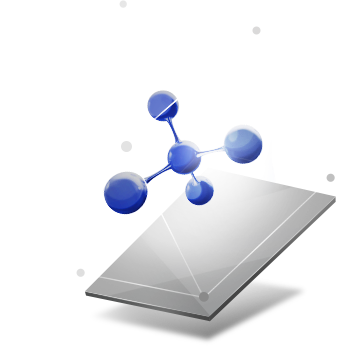
Innovation
Our innovations make your driving experience more electrified
Whatever you imagine, new innovations in Samsung SDI battery are making those dreams a reality for automakers as well as tomorrow’s drivers.
Innovation

Imagine pure electric cars with a driving range of over 300km on a single charge, or super performance cars that are not only perfect for highly competitive races, but also consuming less fuel, reducing carbon footprints.
Whatever you imagine, new innovations in Samsung SDI battery are making those dreams a reality for automakers as well as tomorrow’s drivers.
The ideal battery would be safe, small, and light while still being capable of delivering large amounts of energy. The lithium is the third lightest element (the lightest being hydrogen) and is the lightest metal, allowing lithium-ion batteries higher energy density per unit mass than other chemistries based on nickel or lead. So among lithium-ion battery manufacturers, the winner would be the one who can produce the lithium-ion battery with higher energy density within given space.
Our success in consumer IT battery applications has made us realize that we can assist the automotive industry in addressing a number of challenges such as powertrain performance, fuel economy and CO2 reductions by applying our latest battery technologies.

Samsung SDI is currently mass producing first-to-market and best-in-class products. The industry’s highest volumetric energy-/ power density battery cells with excellent safety and reliability for electric vehicles, plug-in hybrid and hybrid vehicles.
New material and structural innovations in Samsung SDI battery cells significantly enhance vehicle performance. Such innovations stem from the properties of the advanced prismatic form factor
-
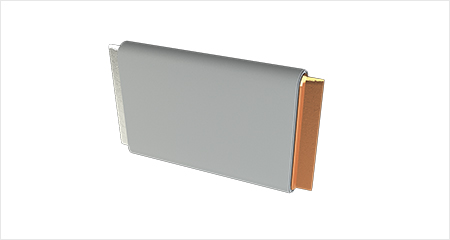 Flexibility in material selection to explore the untapped potential
Flexibility in material selection to explore the untapped potentialWhen it comes to the prismatic lithium-ion battery, there is no constraint in the selection of cathode, anode, and electrolyte materials due to the stability of prismatic outer can design against internal gas pressure. So, the spectrum of active materials that can be adopted for the increased energy density is wider for prismatic batteries than any other forms of batteries.
-
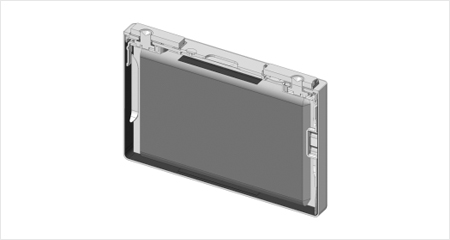 The advanced built-in safety devices
The advanced built-in safety devicesAs Samsung SDI puts safety first in our business, we produce lithium-ion batteries with the best built-in safety devices. We have also developed and applied our high-tech safety devices such as Safety Fuse, Nail Safety Device(NDS), Overcharge Safety Device(OSD), and Safety Functional Layer(SFL) to provide a safer driving experience.
-
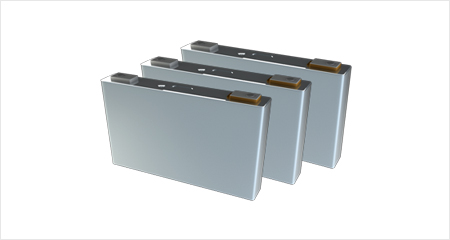 Lifetime durability for better driving experience in the long-term
Lifetime durability for better driving experience in the long-termThe market and the public alike have been concerned as the electric vehicle’s driving distance gets shorter rapidly during the use of the vehicle. Though the capacity reduction of any battery is normal, the question is how to maintain high performance throughout the entire battery life. Samsung SDI’s prismatic battery is hermetically sealed by the laser welding assembly process, thus impervious to outside humidity, while keeping sufficient quantity of electrolyte inside to ensure long-term performance stability.
-
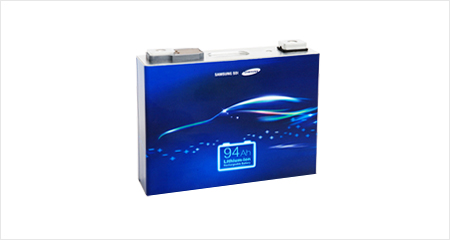 Stackable aluminum outer case for easy modularity
Stackable aluminum outer case for easy modularityThe exterior of Samsung SDI battery cell is made of a stackable prismatic aluminum can, ideal for minimum packaging space. Also, no additional structures are required for a cooling module.

By making technological changes at the manufacturing level including manufacturing automation, the overall battery cost can be brought down, increasing yields and production speed. The market order will be shaped in accordance with manufacturing yields as the EV market grows - new entrants with technological competence at smaller scales are likely to face production difficulties and higher manufacturing costs.
Samsung SDI has a 15-year experience of lithium-ion battery mass production. It sold over 7 billion cells for the past 15 years and is now selling over 1 billion cells per year. The production lines of Samsung SDI are 100% automated. Furthermore, the prismatic lithium-ion battery that Samsung SDI supplies for automotive applications have a relatively short production lead time and high process stability leading to higher productivity and cost reduction compared to other types of batteries.
In addition, roughly 80% of the raw materials used in IT batteries are used in automotive batteries so we achieve better economies of scale through large-scale procurement leveraging the total value chain.

The lithium-ion battery production is a highly complex process incorporating various materials, chemistries, hardware, and software and requires a higher degree of quality control. Strict and consistent quality control is critical because defective products can be attributable to more than one factor throughout the processing chain, such as imperfect materials, defective equipment, or manufacturing errors.
Samsung SDI can say with confidence that it is the one and only company that has not had any quality-related accidents all thanks to its strict disciplines in engineering and manufacturing.
Besides standard automotive quality tools like FMEA (Failure Mode and Effects Analysis) and sub-supplier management systems, Samsung SDI has developed and installed advanced internal processes such as its Manufacturing Executing System (MES) in order to guarantee the highest quality of its products and 100% traceability. As a result, every battery cell produced by Samsung SDI is checked at hundreds of measuring points during the production process and can be individually tracked. This ensures that customers will always get battery cells with the most consistent and highest performance during the entire vehicle lifetime.

In February 2015, Samsung SDI acquired Magna Steyr Battery Systems, an Austria-based subsidiary of Magna International to boost its competitiveness in battery pack system solutions.
Magna Steyr Battery Systems, now named as "Samsung SDI Battery Systems", is the world’s leading supplier of battery packs for electric vehicles.
It has been partnering with global top automakers in automotive battery pack projects including BMW, Volkswagen, Porsche, Renault, Ford, FCA (Fiat Chrysler Automobiles), and Scania.
By combining Samsung SDI’s world-leading cell expertise with the automotive industry track record and battery pack systems know-how of Samsung SDI Battery Systems, we can provide our customers with an enhanced product portfolio, and realize optimized performance and cost synergies through closer collaboration between our development and production teams. Furthermore, by leveraging both companies’ global sales, R&D, and production facilities, Samsung SDI will offer improved local development support in Europe and North America.
Our leadership position as the experienced large-scale lithium-ion battery manufacturer has fueled us to move forward. We will continue to support automakers’ efforts to achieve fuel efficiency targets and also provide electrified driving experience with our leading battery technologies.

This is our guiding force for the innovation and creativity which contributed to becoming what Samsung is today. Based on this philosophy, we are pursuing R&D missions not only to enhance the current performance but also develop disruptive technology to go beyond the limit of current businesses. Our expertise on advanced batteries and collaborative R&D structure with other Samsung affiliates have enabled us to position as the global leader. According to the latest SNE research published in May 2015, Samsung SDI holds the world’s largest number of lithium-ion battery patents, which accounts for 36% of target patents.
At Samsung SDI, over 400 automotive battery researchers and engineers are developing current and next generations of lithium-ion batteries to provide automakers and their customers with better powertrain performance and longer electric driving range.
Further to the development of automotive batteries, Samsung R&D organizations conduct research in an integrated way for transformative innovations. Samsung Material Research Complex (SMRC) is a good example.
SMRC is Korea’s first-ever electronic materials R&D complex. Over 530 scientists and researchers of Samsung Advanced Institute of Technology, Samsung SDI Energy & Chemical Solutions, Samsung Fine Chemicals and other materials-related affiliates teamed up to conduct collaborative research and advance the development of new breakthrough materials. Among them, 380 are specifically focusing on future battery materials and we expect a lot of great synergetic results from this collaboration.



